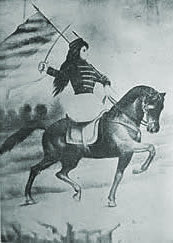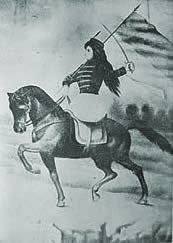
|
Women and Independence in Latin America An exploration of women's involvement in the Latin American Wars of Independence |

|

|
Women and Independence in Latin America An exploration of women's involvement in the Latin American Wars of Independence |

|
Gender:Female
Ethnic origen: White
Events:
| 1775? | - | Viamão | - | Not applicable | - | She was born in Viamão in Rio Grande do Sul, Brazil in 1786 or 1788. |
| 1786? | - | Viamão | - | Unknown | - | She was born in Viamão in Rio Grande do Sul, Brazil in 1786 or 1788. |
| 1800 | - | Rio Pardo | - | Not applicable | - | She was married in Rio Pardo in 1800 to Manuel Inácio Pereira Pinto |
| 1830? | - | Porto Alegre | - | Not applicable | - | She created a school for boys and girls in her home |
| 1833 | - | Rio Grande do Sul | - | Royalist | - | She founded the journal Bellona. |
| 1837 | - | Rio Grande do Sul | - | Not applicable | - | Died |
Connections:
Editors newspapers and magazinesBiography:
Maria Josefa Barreto was born in Viamão in Rio Grande do Sul, Brazil in 1786/88?. She was the illegitimate daughter of Ana Matildes de Silveira and was later adopted by a childless man, Teodósio Rodrigues de Carvalho and became his heir (Muzart, 75). Known in early life as Maria Engrácia she later used the name Maria Josefa after she was married in Rio Pardo in 1800 to Manuel Inácio Pereira Pinto, the jailer in Porto Alegre prison. He disappeared from her life after he himself was put on trial for letting a prisoner escape. He left Maria Josefa with two children José Joaquim born in 1802 and Engrácia Maria born in 1804 (Muzart, 75). She later founded a mixed primary school in her own home and gained a certain reputation for her poetry and “repentismo” (spontaneous oral declamation). She published some Elogios dramáticos and sonnets, including in the Guanabara review. Her son died young at the age of twenty six further reducing her financial support (Muzart, 76-7).
In November 1833, Maria Josefa founded a weekly journal, Belona Irada contra os Sectários de Momo, an outspoken political paper supporting the Caramuru or Monarchist party in the Farroupilha War of Rio Grande do Sul. It lasted until January 1834, running to ten numbers. No known copies survive although there are some references to it and to the reaction it provoked in the republican press, contained in Idade d’Ouro a second journal that Maria Josefa Barreto later founded in 1833 with Manoel dos Passos Figueroa. This newspaper, published with a man’s collaboration, is believed to have run for thirty two numbers, although only one surviving copy, no. 31, is currently known to be in existence in the Museu da Biblioteca Pública in Pelotas. Maria Josefa Barreto’s responses in Idade d’Ouro to republican press attacks on Belona Irada suggest how the tenor of Barreto’s first attempt at political journalism in Belona Irada would have been (Muzart, 77-8).
Beyond her interventions in journalism and newspaper publishing, her poetry and her venture into educating primary school children together, little is known of Maria Josefa Barreto though she is often credited as being Brazil’s first woman journalist. Something of her impact on other monarchist women in the region may be gauged however from the fact that she receives a powerful poetic eulogy from the younger poet Delfina Benigna da Cunha in her poem “Epístola” written “em resposta à outra que lhe dirigiu a Ilma. Sra. D. Maria Josefa Barreto Pereira Pinto” published in da Cunha’s Poesias oferecidas às senhoras riograndenses (1834).
Barreto died in 1837 (Muzart, 79).
References:
Muzart, Zahidé Lupinacci (editor). (2000) Escritoras Brasileiras do Século XIX
Davies, Catherine, Brewster, Claire and Owen, Hilary (2006) South American Independence. Gender, Politics, Text